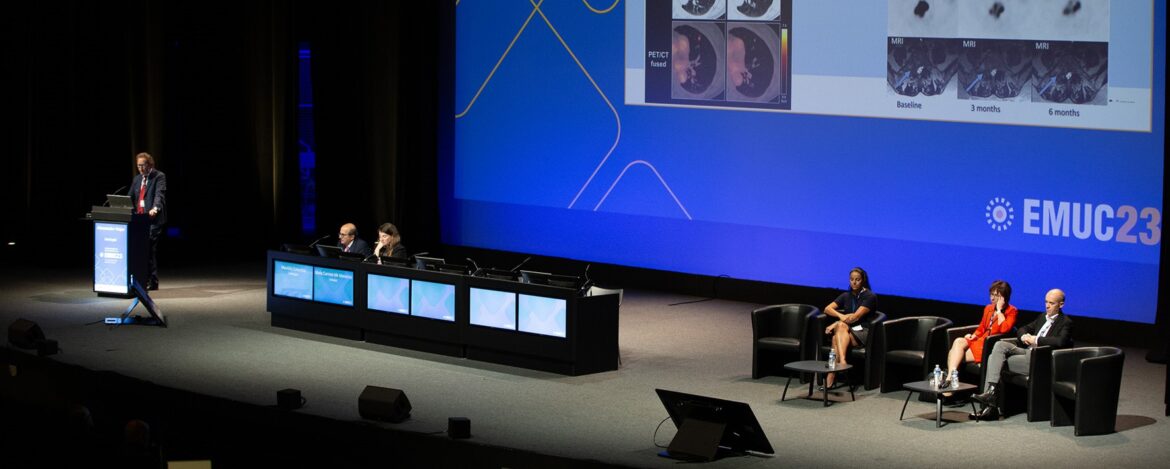Individualised approaches to kidney cancer were deliberated in Plenary Session 12 on the afternoon of day three at EMUC23. This session was co-chaired by pathologist Prof. Maurizio Colecchai (IT) and urologist Dr. Carmen Mir Maresma (ES).
“The goal of imaging in kidney cancer is to get the most valuable information for clinical decision making.” stated urologist Dr. Alessandro Volpe (IT) in his lecture ‘New imaging approaches in kidney cancer’.
According to Dr. Volpe, histological characterisation of renal cell carcinoma (RCC) was historically of little clinical value for treatment decision-making, but based on new evidence, it is now considered increasingly important when deciding on surgery versus non-surgical, as well as treatment approaches (partial nephrectomy versus radical nephrectomy).
“Histological characterisation of renal tumours in imaging is challenging. Percutaneous biopsy is the current gold standard for histological diagnosis. What we have is good, but it is not perfect.”
“Molecular imaging techniques for renal tumours are emerging with potential”, said Dr. Volpe. We have the 99mTc–sestamibi SPECT/CT, and there is a study from the UK that will tell us more about this option soon (‘Protocol for the MULTI-centre feasibility study to assess the use of 99mTc–sestamibi SPECT/CT in the diagnosis of kidney tumours – MULTI-MIBI study’). The other two techniques are the carbonic anhydrase IX (CA IX), and the 89Zr-girentuximab PET/CT, which is more useful within advanced settings (as seen in the ZIRCON study).
According to Dr. Volpe that in the future, these three molecular imaging techniques have the potential to allow accurate, non-invasive characterisation of histology of renal masses and reduce the need for invasive renal tumour biopsy. “There is also the potential to improve staging and assessment of treatment responses in mRCC, as well as improve clinical management by aiding the selection of patients versus conservative treatment of small renal masses (SRMs) and tailoring treatment for advanced RCC. Radiomics and AI-powered interpretation tools may help maximise the diagnostic accuracy and utility of these imaging techniques.”
Patient selection for delayed nephrectomy?
In her lecture, ‘Indications of treating the primary in metastatic kidney cancer in the immunotherapy (IO) era’, Dr. Géraldine Pignot (FR) shared results from the CARMENA trial: “Delayed nephrectomy after initial systemic treatment with sunitinib in good responder patients is associated with long overall survival (OS), supporting this approach as a good therapeutic strategy.”
Dr. Pignot stated that delayed nephrectomy does not suit all patients but suitable candidates are those with a complete response on metastatic sites. Delayed nephrectomy can help to achieve complete response (CR) in selected patients and has good oncological outcomes at three years, plus de-escalation by stopping systemic treatment.
“But the impact on survival is still unknown, and there is the potential of challenging surgery (depending on the primary tumour downsizing.) Remember that surgery is not the only option for some patients,” concluded Dr. Pignot.
Check out the EMUC23 Resource Centre to view the full presentations.



